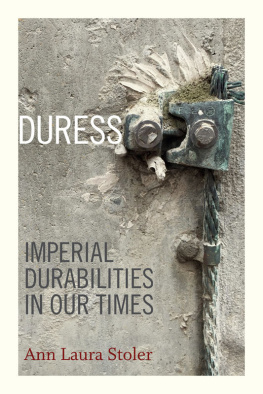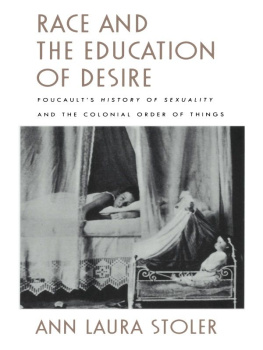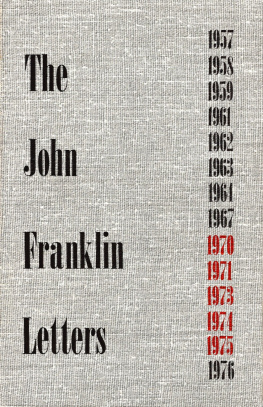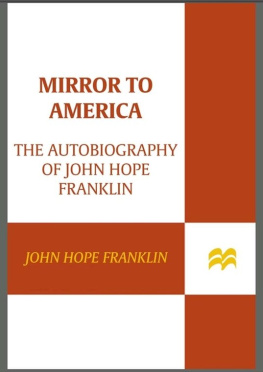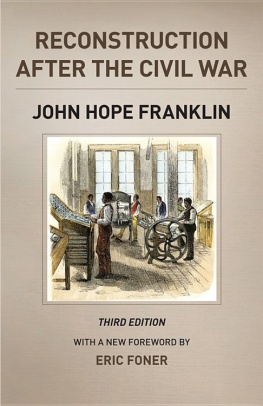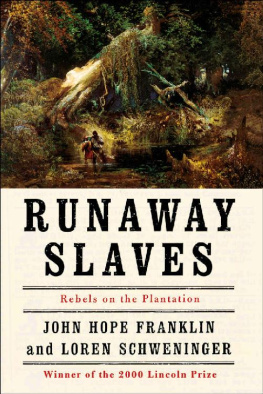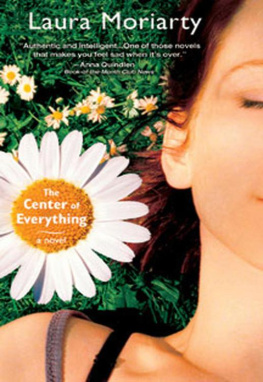Ann Laura Stoler - Duress (a John Hope Franklin Center Book)
Here you can read online Ann Laura Stoler - Duress (a John Hope Franklin Center Book) full text of the book (entire story) in english for free. Download pdf and epub, get meaning, cover and reviews about this ebook. year: 2016, publisher: Duke University Press, genre: Politics. Description of the work, (preface) as well as reviews are available. Best literature library LitArk.com created for fans of good reading and offers a wide selection of genres:
Romance novel
Science fiction
Adventure
Detective
Science
History
Home and family
Prose
Art
Politics
Computer
Non-fiction
Religion
Business
Children
Humor
Choose a favorite category and find really read worthwhile books. Enjoy immersion in the world of imagination, feel the emotions of the characters or learn something new for yourself, make an fascinating discovery.
- Book:Duress (a John Hope Franklin Center Book)
- Author:
- Publisher:Duke University Press
- Genre:
- Year:2016
- Rating:5 / 5
- Favourites:Add to favourites
- Your mark:
- 100
- 1
- 2
- 3
- 4
- 5
Duress (a John Hope Franklin Center Book): summary, description and annotation
We offer to read an annotation, description, summary or preface (depends on what the author of the book "Duress (a John Hope Franklin Center Book)" wrote himself). If you haven't found the necessary information about the book — write in the comments, we will try to find it.
Duress (a John Hope Franklin Center Book) — read online for free the complete book (whole text) full work
Below is the text of the book, divided by pages. System saving the place of the last page read, allows you to conveniently read the book "Duress (a John Hope Franklin Center Book)" online for free, without having to search again every time where you left off. Put a bookmark, and you can go to the page where you finished reading at any time.
Font size:
Interval:
Bookmark:
A JOHN HOPE FRANKLIN CENTER BOOK
Ann Laura Stoler
DURESS
IMPERIAL DURABILITIES IN OUR TIMES
Duke University Press Durham and London 2016
2016 Duke University Press
All rights reserved
Printed in the United States of America on acid-free paper
Designed by Courtney Leigh Baker
Typeset in Quadraat Pro by Westchester Publishing Services
Library of Congress Cataloging-in-Publication Data
Names: Stoler, Ann Laura, author.
Title: Duress : imperial durabilities in our times / Ann Laura Stoler.
Description: Durham : Duke University Press, 2016. | A John Hope Franklin Center Book. | Includes bibliographical references and index.
Identifiers: LCCN 2016024770
ISBN 9780822362524 (hardcover : alk. paper)
ISBN 9780822362678 (pbk. : alk. paper)
ISBN 9780822373612 (e-book)
Subjects: LCSH : EuropeColoniesHistoriography. | EuropeColoniesRace relations-History20th century. | ImperialismHistoriography. | PostcolonialismHistoriography.
Classification: LCC JV 151 . S 75 2016 | DDC 325/.34dc23 LC record available at https://lccn.loc.gov/2016024770
Cover art: Photograph by Tessa Hirschfeld-Stoler
THIS BOOK IS DEDICATED to those living contained and constrained in two places I have been honored to teach: Palestine and at the Eastern Correctional Facility in Napanoch, New York. In their different ways, these colleagues, students, and friends have sharpened my capacity to look and feel for the forms that duress takes and the endurance it demands. Their insightscritical, conceptual, visceral, and acutehave clarified both those questions worth attending to and why they matter for those living in the shadows and glare of imperial formations.
CONTENTS
Use of the term colonial studies or (post)colonial studies rather than postcolonialism may call for some explication. I have avoided the term postcolonial for some time. Despite the warnings of those who rightly insist that it is not a time period but a critical stance. In practice, however, the term postcolonial often references a critical perspective on a past colonial situation (too easily made distinct from our own) or on those who bear the costs of living in a space that was once colonial and is no more. However finessed, the bottom line is something that this book attempts to tackle: the temporal and affective space in which colonial inequities endure and the forms in which they do so.
I have addressed these temporal difficulties here in several ways. No matter how post ones stance may be, the fact of living both colonial relations that are alive and well and postcolonial predicaments at the same time should command our political work and analytic attention. In arguing for a recursive history and the uneven sedimentation of colonial practices in the present, I intend to retain the post as a mark of skepticism rather than assume its clarity. I choose to avoid the artifice that makes the cut between the colonial and postcolonial before asking how those temporalities are lived. I prefer (post)colonial studies to emphasize a colonial presence in its tangible and intangible forms and to acknowledge that there are colonial presentsas those who work in Australia and the Americas would argue and those concerned with a Palestinian/Israeli context would contend.
For a more informal discussion of the trajectory of this book and the concerns that have informed its writing, see the interview done by Valentine Daniel for Public Culture (24, no. 3 [Fall 2012]: 487508). I thank Val for crafting an interview that allowed movement among personal anxieties, political investments, and conceptual blockages, concerns that more often are submerged in formal genres of exposition. In the end, this remains a project in formation with more to unlearn and to change.
I think of appreciations to underscore the privilege and accrued valuerendered in a flash or in longer gestationof thinking with colleagues, students, and friends. My hope is that their patience and persistence have made the arguments clearer, the arc of the book more accessible, and its form traceable to those who have inspired me along the way.
I thank Larry Hirschfeld, who persistently demanded a simpler word, a cleaner statement, a better parsed phrase, and Adi Ophir, with his fine-grained thinking about concepts (despite and because of my adherence to conceptual labor and his to conceptual performance), who has been such a generous presence and inspiration and who provided detailed comments on a condensed version of , I especially thank Didier Fassin, Eric Fassin, Larry Hirschfeld, Achille Mbembe, Richard Rechtmann, Janet Roitman, and Miriam Ticktin for their insights and comments. A shorter version of that chapter appeared in Public Culture (23, no. 1 [Winter 2011]).
and often offered an explication that was better than my own. An earlier version of this chapter appeared in Public Culture (18, no. 1 [Winter 2006]).
A first version of first appeared as Racial Histories and Their Regimes of Truth, in Political Power and Social Theory (Stamford, CT: JAI Press, 1997).
was originally conceived with my former colleagues at the New School for Social Research, Adriana Petryna and Vyjayanthi Rao, in fall 2005. I thank both of them for thinking with me about the politics of scarred tissue, debris, and exposures. The chapter itself appeared in partial form in Imperial Debris: On Ruins and Ruination (Durham, NC: Duke University Press, 2013).
Finally, I thank Ken Wissoker, who has always been the consummate editor and gently makes me know that revisions based on readers responses, however trying, make things better. Both Charles McDonald and Katie Detwiler read through the essays, as the manuscript became a book in formation. Both of them, in their eminently incisive ways, pushed me to make explicit sensibilities that they each reminded me were my own. Finally Kevin Swann took on the task of preparing the manuscript for publication, at a time that it was not easy for him to do so and Erick Howard kindly and skillfully finished the preparation and rendered the index, what I always think of good references to be, a conceptual roadmap, attentive to those connectivities that most matter as readers cull what is useful to think withfor adjacent efforts or different tasks.
How do colonial histories matter in the world today? Are not these histories of a past that is over and done with, as former imperial polities and those once subject to them deal with more pressing issues: epidemics, disaster management, persistent racial inequities, ecological catastrophes, forced dislocations and refugee populations, humanitarian failures, border regimes, and security protocols that impinge on their everyday and future possibilities? Did not decolonization confer sovereignty and autonomy nearly fifty years ago on most of the world that was once colonized, making postcolonial disorders and globalization the issues at hand? And do not these histories matter more to a bevy of academics than they do in a contemporary world in which the past is something that needs to be reckoned with so younger generations can be freed to move on?
It is one premise of this book that these are indeed issues of the day but that many of the most urgent onesbe they toxic dumping in Africa, devastated waste lands, precarious sites of residence, ongoing dispossession, or pockets of ghettoized urban quartersare features of our current global landscape whose etiologies are steeped in the colonial histories of which they have been, and in some cases continue to be, a part. It is the contention of this book that many of these conditions are intimately tied to imperial effects and shaped by the distribution of demands, priorities, containments, and coercions of imperial formations.
Those connectivities are not always readily available for easy grasp, in part because colonial entailments do not have a life of their own. They wrap around contemporary problems; adhere in the logics of governance; are plaited through racialized distinctions; and hold tight to the less tangible emotional economies of humiliations, indignities, and resentments that may manifest in bold acts of refusal to abide by territorial restrictions imposed or in the flare of burning tires in sensitive urban quarters. Colonial counterinsurgency policies rest undiluted in current security measures. Molten in their form, colonial entailments may lose their visible and identifiable presence in the vocabulary, conceptual grammar, and idioms of current concerns. It is the effort of this venture to halt in the face of these processes of occlusion and submersion, to ask about how they work, their differential effects; and on whom they most palpably act.
Next pageFont size:
Interval:
Bookmark:
Similar books «Duress (a John Hope Franklin Center Book)»
Look at similar books to Duress (a John Hope Franklin Center Book). We have selected literature similar in name and meaning in the hope of providing readers with more options to find new, interesting, not yet read works.
Discussion, reviews of the book Duress (a John Hope Franklin Center Book) and just readers' own opinions. Leave your comments, write what you think about the work, its meaning or the main characters. Specify what exactly you liked and what you didn't like, and why you think so.

